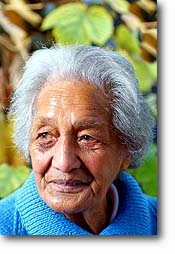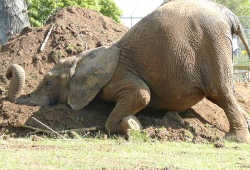A Snapshot Of The Rich Life Of 90-Year-Old Pau Leonard Adrienne Anderson – 12/10/01
Reprinted from te Karaka, the Ngai Tahu Magazine makariri/winter 2001
|
|
| Pau Leonard |
Pau Leonard is about to turn ninety-one. Her long life is, a rich tapestry crafted with hard work, great sadness, resilience and self-reliance – a long journey of wonderfully enriching experiences.
Born Katarina Pau Kaukau at Woodend on August 27, 1910 and named after her grandmother Katarina Pau, she is the daughter of Tini Hinewetea and Waata Momo. Pau, or “Tom” as she was known by her whanau, was the sixth born of eight children (Haumea, Erina, Horopapera, Tini Hinewetea, Rakanui, Katarina Pau, Riria and Kereopa). The family adopted a ninth child, her brother “Pakeha Jack”. Pau went to school at Woodend but when at the age of eight her mother died of the flu during the1920 epidemic she was sent to board at Te Waipounamu College in Christchurch. While she enjoyed her time at the school she says it bored her and she was often in trouble for not listening.
Pau remembers parts of her childhood. One story she tells is as a small child having to go to Lyttelton with Iwi Te Aika to be presented to Lord Bledisloe. She no longer remembers why she was chosen but recalls that it was a very special occasion.
Not long after leaving school Pau met her husband to be and moved to Temuka where she was to spend more than sixty years. On March 27, 1929 Pau married Arapata Renata ll (also known as Albert Leonard). They had three children, Mona Mataroa, Riria Kahukaka and Albert. Pau also had a son Peter prior to her marriage to Arapata.
Pau and Arapata lived on a farm and milked cows, transporting the milk to the factory in Temuka in a horse and cart. When World War ll broke out in 1939 Arapata went to Fiji to work on the construction of the runway at the Fiji Airport, returning home when Mona was struck by meningitis and died at the age of eleven. It was only four years later that they lost their son Albert to rheumatic fever and five years after that Riria at the age of eighteen to peritonitis TB. Riria had married Ronald Beaton just three months prior to her death and had a year earlier given birth to her daughter Tina.
After the death of their three children, Arapata left Temuka and went to work on the Public Works scheme at the Roxburgh Dam in Central Otago. Pau stayed on in Temuka bringing up Riria’s daughter Tina and the many other children who called her house home. Over her years in Temuka Pau was to be mother to more than sixty children. An amazing feat considering she also went to work to earn enough to provide food and clothing for all.
After Arapata left she worked for NZ Insulators. Tina recalls her mother dropping her off at Kindy in the mornings and then heading off to work. Tina would bike to her mothers work at the end of the day and wait for her to finish. She was also the boss of a potato picking gang for some time holding the reputation as the fastest picker on the line – up to 90-100 sacks per day. At another time she worked for Timaru Fisheries killing and cleaning poultry and splitting and packing fish. Pau recalls putting so much fish in the boxes and then putting some aside to take home. She also cooked for a shearing gang for a while.
When Tina was five Arapata returned to Temuka and Pau and he took up their life together again, adopting Janet Waaka and Roger Stevens into their family. Among the many other children to be privileged to the warmth and caring of Pau were children of the Crofts, Waaka, Manning, Broughton, Rickus, Briggs, Reihana and Anglem whanau. There was also Fiji (Peter Fuller) – an Australian aboriginal boy who had come to New Zealand with Worth’s circus. Fiji went to stay with the whanau and never left. In the late 1960s Riki Rangi came to live with them. Tina says there were always visitors in their house. She would wake up in the morning and there’d always be someone in her bed that wasn’t there when she had gone to bed. The three-bedroom house with the kitchen and lounge as one room was at all times welcoming and often overflowing. In 1949 Pau and Arapata moved into the very first Maori Affairs home to be built in Temuka. Built next door to his parent’s home, it was the only house in Temuka with an inside toilet.
Pau was never afraid of hard work. Tina recalls that she was always up before daylight getting her housework done. They always had the cleanest house and the whitest washing in the area. Her mother had a wonderful knack for making food out of nothing – even if all she had to offer was bread and jam and a cup of tea it was always offered whenever anyone came to the door. “I always taught my children that no matter who comes to the door you make them a cup of tea”. Pau says, “all the relations liked to come and visit at our house because they knew they would get kai”. Tina reckons Pau was so fanatical that she invented work – even to sweeping the dirt path outside their home. On Sundays Pau and Arapata would go down to the Arowhenua Hall with their children and clean the hall and tidy the grounds. “You won’t get the children of today cleaning the way our kids did”, Pau reckons.
Tina says her parents were always very supportive of her and took an active interest in her sporting endeavours. They always provided the best of opportunities for their children as well as caring for their extended whanau and the Temuka community. Arapata was always there to lend a hand for tangi and every Easter and Christmas they would be making up food packages and sending them up the line – ducks, geese, mushrooms and anything else that was around at the time.
Food is something very dear to Pau. Her life in Temuka was lived in seasons and catching the food associated with that season. She recalls with great fondness stories of making mud traps and catching kanakana in the Opihi river, going up into the bush and digging for long worms and then threading them on to flax which was then platted and looped onto a stick to go bobbing for eels at night. She laughs as she recalls throwing the eels onto the bank and having the boys hit them over the head. There were always big teams who went out to get the eels.
They also collected seagull eggs, fresh water lobster, whitebait, pipi, mussels, fat hen and watercress. One of her favourite meals from those days was groper and blue cod heads in a boil up with onions and potatoes.
When Pau wasn’t working or looking after the whanau she played netball for the Glee Club in Temuka coached by Kingi Rehu, a pastime she kept up for many years.
One of her fondest recollections is going down to Pukaweko Island with Auntie Tautau Wesley for the titi season. She talks of the preparation, having to get permission to go there because she didn’t have rights, collecting flax and making baskets, collecting kelp and blowing it up so that the titi and its intestines could be stored in it. Pau says that when she was on the Island you never wasted anything.
In 1951 Pau went on a tour of the South Island with Te Ari Pitama and the Melody of Maoriland Concert Party. She started out as cook but it wasn’t long before she ended up on stage. She remembers also the time when the Howard Morrison Quartet was stranded in Temuka for a while. Although they were staying at Arowhenua they like the many others would visit her home where she would feed them and let them have a bath.
Arapata died in 1978. Pau stayed in Temuka until 1985 when she moved to Australia to join Tina and her family. She stayed there until 1990 coming home because she thought she was dying. Tina recalls her mother arriving back in Christchurch on a Friday night refusing to go home to Temuka no matter what. Early on the Monday morning they got a call to say that the house in Temuka had burnt to the ground – yet another tragedy in Pau’s life. Pau’s health improved and in 1995 she went back to Australia for the Christmas holidays and ended up staying on once more. This time she was living with her grandson Darryn and his family helping out with looking after the children. Pau has many lovely memories of time spent with her mokopuna, Rosanna, Arapata, Hamuera, Kerry, Roimata, Renata, Darryn, Melanie and Amiria and their children Joseph, Nicola, Fiona, Tracey and Melanie. She now lives in Christchurch with Tina and her daughter Amiria.
Pau may have experienced enormous hardship and sadness in her ninety years but it has never stopped her from making the most of life’s opportunities. Even in the hard times Pau managed to focus on the good. Her strength and courage are an example to us all.




